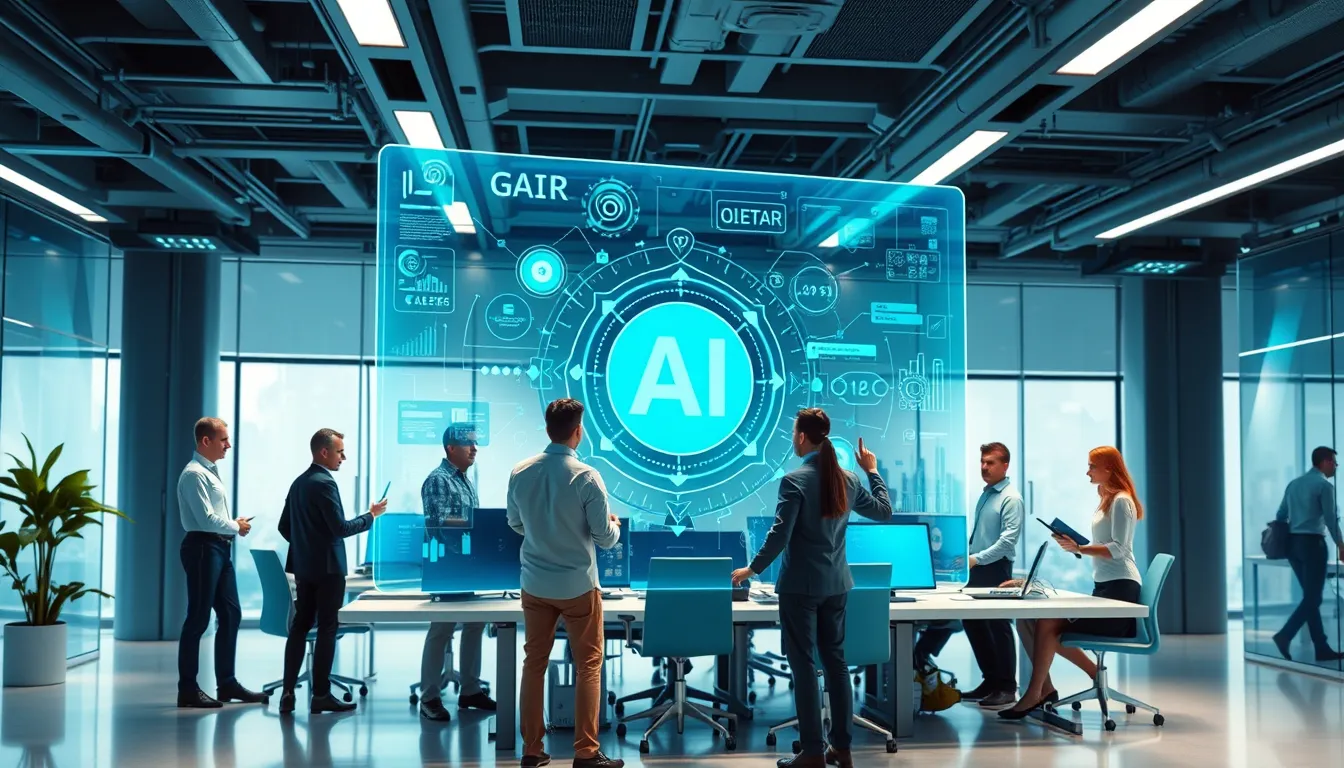Now Reading: Innovative OpenAI Enterprise AI Tools Boost Integration
-
01
Innovative OpenAI Enterprise AI Tools Boost Integration
Innovative OpenAI Enterprise AI Tools Boost Integration

Innovative OpenAI Enterprise AI Tools Boost Integration
Introduction
OpenAI enterprise AI is setting a new standard in business technology. Known widely for its groundbreaking ChatGPT innovations, OpenAI is now intensifying its efforts in the enterprise realm by offering a suite of sophisticated AI tools designed to streamline core operations. In this article, we delve into how these tools drive business integration, transform operational practices, and set the stage for a new era of efficiency and accuracy in various industries.
The emergence of AI-powered solutions has revolutionized business processes across diverse sectors. By incorporating advanced algorithms and deep learning models, companies are now better equipped to handle tasks that traditionally relied on manual intervention. With the introduction of OpenAI enterprise AI, businesses are finding new ways to enhance their operational workflows, making the integration process smoother and more reliable. This technological shift embraces a future where AI is not just an add-on but a critical component in achieving overall business excellence.
Key Features and Business Integration
The latest offerings from OpenAI enterprise AI are engineered with a clear focus on enhancing business integration. These tools are designed to automate repetitive tasks, optimize workflow efficiency, and improve data handling capabilities. Whether it is financial analysis automation or customer support streamlining, these technologies are making significant inroads into everyday business functions.
One of the central elements is the seamless integration of AI into existing business ecosystems. Companies are now able to leverage enterprise AI tools to connect disparate systems and streamline communication between various departments. This connectivity not only facilitates faster data exchange but also reduces the risk of errors by automating tasks that were previously manually handled. For instance, businesses using these tools benefit from improved workflow synchronization, where software platforms can communicate effectively with each other, enhancing the overall decision-making process.
Additionally, the adoption of OpenAI enterprise AI in business integration brings with it enhanced scalability. As organizations grow, the complexity of their operations tends to increase. AI-driven automation tools are uniquely positioned to handle this growth by automating complex workflows without sacrificing accuracy or speed. This scalability ensures that businesses continue to operate efficiently, even as operational demands evolve.
Automating Financial Analysis with AI
One of the standout features of OpenAI enterprise AI is its capacity to automate financial analysis. Traditionally, financial analysis has been a labor-intensive process requiring meticulous attention to detail and vast amounts of data. By integrating AI, companies can now automate these analyses, reducing the need for manual oversight and significantly decreasing the likelihood of human error.
Automating financial analysis involves processing large volumes of data at speeds that far exceed human capability. AI algorithms are capable of identifying trends, anomalies, and patterns within financial reports, leading to more accurate forecasting and risk assessment. This enhanced level of precision supports data-driven decision making, enabling organizations to act swiftly based on insights derived from comprehensive data analysis. Furthermore, the integration of AI in financial processes not only shortens processing times but also boosts accuracy, making it a powerful tool for companies looking to optimize their financial operations.
Consider a scenario where an enterprise needs to analyze quarterly performance data. Traditional manual analysis can be both time-consuming and prone to oversight. However, by deploying OpenAI enterprise AI tools, companies can automate the extraction and interpretation of key performance indicators, offering real-time insights that empower finance departments to make informed decisions quickly. The results are clearer risk analyses, better budget forecasts, and an improved overall strategic direction.
Enhancing Customer Support Through AI Automation
Beyond financial analysis, OpenAI enterprise AI significantly impacts customer support automation. In today’s digital age, customer expectations are higher than ever, and businesses are under continual pressure to provide quick, efficient, and personalized support. By harnessing the power of enterprise AI, companies can automate routine customer service interactions, thereby freeing up human agents to address more complex issues.
Automated customer support systems powered by advanced AI can handle a wide range of tasks—from answering frequently asked questions to managing ticketing systems and even predicting customer concerns before they arise. These systems not only reduce wait times but also ensure consistency in service quality, enhancing the overall customer experience. With capabilities such as natural language processing (NLP), chatbots and virtual assistants are becoming increasingly adept at understanding and resolving customer queries effectively.
Moreover, AI-driven customer support tools can learn and improve over time, gradually tailoring their responses based on historical interaction data. This learning curve allows companies to refine their customer service strategies continuously, ensuring that every interaction serves to improve the system’s responsiveness and accuracy. As AI systems become more familiar with customer behavior patterns, they can preemptively offer solutions and recommendations, further enhancing service quality.
Ethical Challenges in Enterprise AI
As with any transformative technology, the rise of enterprise AI brings with it a set of ethical challenges that need to be navigated with care. Issues such as data privacy, AI transparency, and misunderstanding of automated decision-making processes are critical concerns in the modern digital landscape. OpenAI enterprise AI is no exception to these challenges, and it is actively addressing them through rigorous ethical standards and transparent practices.
Ethical challenges in enterprise AI primarily revolve around ensuring that automated systems operate fairly and without bias. Mitigating unintended consequences of AI deployment, especially in sensitive sectors like finance and healthcare, is a priority. In response, OpenAI has implemented robust governance frameworks designed to ensure that its AI tools comply with global data protection regulations and ethical guidelines. By doing so, it reinforces the trust placed in its systems by businesses and consumers alike.
Addressing these concerns involves a multi-faceted approach. First, the development process incorporates extensive bias mitigation techniques, ensuring that the AI operates in a balanced and objective manner. Second, transparency in how the AI system makes decisions is critical. OpenAI enterprise AI tools provide detailed insights into their operation, allowing stakeholders to understand and verify the underlying decision-making processes. This level of transparency is essential for building confidence among users and regulators.
Furthermore, collaboration with external auditors and regulatory bodies helps maintain a high standard of accountability. OpenAI remains committed to continuous improvement in its ethical practices, ensuring that its technologies not only push the boundaries of innovation but also adhere to the highest standards of integrity and responsibility.
Partnerships and Industry Applications
Strategic partnerships are a cornerstone of OpenAI’s approach to integrating enterprise AI into the business landscape. By collaborating with industry leaders such as Microsoft, OpenAI is able to extend the reach of its innovative tools and ensure they meet the rigorous demands of various sectors. The collaboration with Microsoft Azure, for example, provides a robust cloud infrastructure that supports the scalability and security needed for modern enterprise applications.
These partnerships have yielded significant advancements across multiple sectors, including healthcare, legal, customer service, and beyond. In healthcare, for example, AI tools are being used to analyze patient data, integrate diagnostic information, and ultimately enhance patient outcomes. Legal firms are leveraging AI to automate document review and case analysis, thereby reducing workload and minimizing the risk of oversight. In the realm of customer service, AI-powered solutions have redefined how businesses interact with their clientele, ensuring responsive and efficient support.
In each of these sectors, the role of AI is to augment human capabilities rather than replace them. The goal is to provide decision-makers with tools that enhance their expertise and allow them to focus on higher-level strategic challenges. By ensuring that AI systems are transparent, ethical, and accurate, companies can successfully integrate these technologies into their daily operations without compromising on quality or integrity.
Further applications include supply chain management, where AI optimizes logistics and reduces operational bottlenecks, and marketing, where predictive analytics drive targeted campaigns based on consumer behavior insights. These examples underscore the versatility and applicability of OpenAI enterprise AI across various industries. The resulting efficiency gains and productivity enhancements represent a significant competitive advantage for businesses willing to embrace these technologies.
Addressing Common Concerns and Future Directions
While the benefits of OpenAI enterprise AI are immense, it is important to address the concerns that businesses may have when adopting new technologies. One common concern is the fear of job displacement. Although AI tools can automate certain functions, they are primarily designed to augment and enhance human capabilities rather than replace them. By streamlining complex and repetitive tasks, these tools free up human employees to focus on strategic decision-making and creative problem-solving, ultimately leading to a more dynamic and innovative workforce.
Another concern relates to data security and privacy. In an era marked by frequent cyber threats, ensuring that AI systems handle sensitive data securely is paramount. OpenAI enterprise AI integrates state-of-the-art security protocols to safeguard information against unauthorized access and breaches. By continuously updating these measures in accordance with industry standards, OpenAI maintains a high level of trust and reliability with its clientele.
Looking into the future, one can expect the capabilities of enterprise AI to expand even further. Continuous advancements in machine learning, natural language processing, and data analytics will drive the evolution of more sophisticated AI solutions. These tools will likely integrate seamlessly with emerging technologies such as the Internet of Things (IoT) and blockchain, further broadening their applications and impact. As these technologies converge, businesses will be better positioned to tackle complex challenges and capitalize on new opportunities in a rapidly changing digital landscape.
Conclusion
The evolution of OpenAI enterprise AI tools represents a significant milestone in modern business technology. With cutting-edge capabilities in financial analysis automation, customer support enhancement, and comprehensive business integration, these tools are poised to transform how organizations operate. The strategic partnerships, such as those with Microsoft Azure AI, further accentuate the robustness and scalability of these solutions, ensuring that businesses can stay agile in a competitive market.
Moreover, by proactively addressing ethical challenges and ensuring transparency in AI operations, OpenAI is paving the way for responsible innovation. As companies continue to navigate digital transformations, the integration of enterprise AI emerges not only as a competitive advantage but also as a critical component in building resilient, future-ready business models. For organizations eager to embrace the future of business technology, OpenAI enterprise AI offers a path toward enhanced efficiency, improved decision-making, and sustainable growth.
For more insights on leveraging these cutting-edge solutions, explore additional resources available on the official OpenAI website and Microsoft Azure AI platforms:
In summary, the journey toward transforming business processes with modern AI tools is well underway. OpenAI enterprise AI stands at the forefront of this movement, championing innovations that drive integration, efficiency, and reliability in business operations worldwide. Embracing these technologies today not only prepares enterprises for the challenges of tomorrow but also illuminates the path toward a more connected, intelligent future.

























